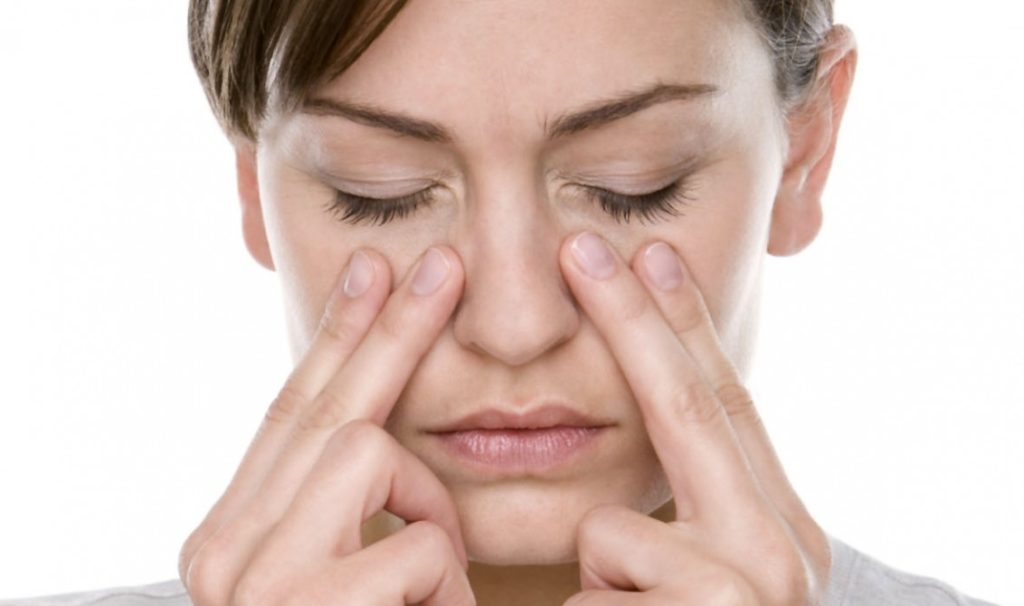Sinusitis

- Sinuses around the cheekbones are called maxillary sinuses (the biggest).
- Frontal sinuses are located in the low-center of your forehead
- Ethmoid sinuses are located in between the eyes.
- Sinuses in bones behind the nose are sphenoid sinuses.
Sinusitis is a disease and in known as an inflammation or swelling the sinuses. Air is present in healthy sinuses, but whenever these sinuses become clogged with fluid, germs can grow and cause an infection.
- Allergies, bacteria or a virus are the main causes leading to sinusitis.
- It is a self-limiting condition, but at times medical attention is needed.
- Chronic sinusitis lasts for more than 12 weeks.
Sinusitis can be acute or chronic. It can result from various causative agents such as viruses, bacteria, fungi, allergies, or even an autoimmune reaction.
It is an uncomfortable and painful condition and usually heals without medical intervention. But, if it not healing on its own and the symptoms last more than 7 to 10 days one should see the doctor.
Symptoms
Symptoms usually depend on the duration and severity of the infection.
Mostly people who have more than two symptoms are categorized under acute sinusitis. At times sinusitis is associated with thick, green or yellow nasal discharge along with facial pain and pressure.
Below are some of the major symptoms:
- Blockage of the nose
- Usually a nasal discharge
- Person is unable to smell
- congestion
- cough
Aggravated sinusitis has below symptoms:
- Fever
- Foul-smelling breath
- A general tiredness and weakness
- Dental pain
- Headache
If these symptoms continue for 12 weeks or longer one must visit a doctor, as it could be chronic sinusitis
What are the causes of sinusitis?
Sinus is mainly caused as a result of fluid accumulation in the sinuses. This harbors germs.
- Viruses:90 percent of sinusitis in adults is caused due to viral infection
- Bacteria: 1 out of 10 cases in adults is caused by bacteria
- Pollutants: Chemicals or irritants propels the mucous growth
- Fungi: When sinus are infected by fungi it is called as allergic fungal sinusitis (AFS),
What increases the chances of sinusitis?
- A history of respiratory tract infections, such as the common cold
- Inflammation caused due to nasal polyps, or small growths
- A compromised immunity in a person due to some health condition or some kinds of treatment
- Allergy to dust, pollen, and animal hair
- Deviated nasal septum
What are the types of sinusitis?
Sinusitis is primarily of two types and how soon it recovers is dependent on the type of sinusitis.
- Acute sinusitis: This lasts up to 4 weeks and is the most common type.
- Chronic sinusitis: Symptoms lasts, or reverses, after 12 weeks. Surgery might be needed to cure it
Diagnosis
A doctor usually carries out a physical examination to check a person suffering from sinusitis. ENT specialist may insert an endoscope into the nose, which provides a detailed image. In cases of persistent or severe sinusitis, a CT scan may be needed.
Treatment
Treatment options depend on the duration of sinusitis
Treatment of acute sinusitis:
Most acute cases heal without any treatment.
A nasal spray may relieve symptoms. In case if one does not recover, home remedies and over-the-counter (OTC) medications can be used to relieve symptoms. Antibiotics are the treatment of choice as bacterial sinusitis mostly has a bacterial nature. However, it is important to visit a doctor under below mentioned situations:
- Symptoms lasting for more than 7 to 10 days.
- Fever which shoots upto 101.5° Fahrenheit.
- Persistent Headache.
- Difficulty in vision
- Person is unable to recover even after the medicines.
Chronic sinusitis
Mostly chronic sinusitis does not have a bacterial nature, so antibiotics are unlikely to resolve symptoms. A fungal infection can be treated with antifungal drugs.
In allergic sinusitis, treating allergies with shots or reducing and avoiding exposure to allergens can minimize the infection.
Surgery
If sinusitis is caused by deviated septum surgery is usually recommended. Surgery may also be advised if there are polyps, or if the sinusitis has resisted all other treatments.
Functional endoscopic sinus surgery (FESS) is the surgical procedure used for treatment and septoplasty is used in case of deviated nasal septum. Treatment may still be required following surgery to prevent the return of sinusitis.
Surgery should always be the last option for treating sinusitis in children.
Prevention
The following steps may help prevent sinusitis:
- Maintain good hand hygiene.
- Avoid smoking.
- On time vaccination.
- Refrain from people infected with cold and other respiratory infections.
- Use air conditioning units to prevent mold and dust from collecting.
Sources:
https://medlineplus.gov/sinusitis.html
https://medlineplus.gov/ency/article/000647.htm
https://www.ncbi.nlm.nih.gov/pubmedhealth/PMH0072669/
https://www.betterhealth.vic.gov.au/health/conditionsandtreatments/sinusitis


